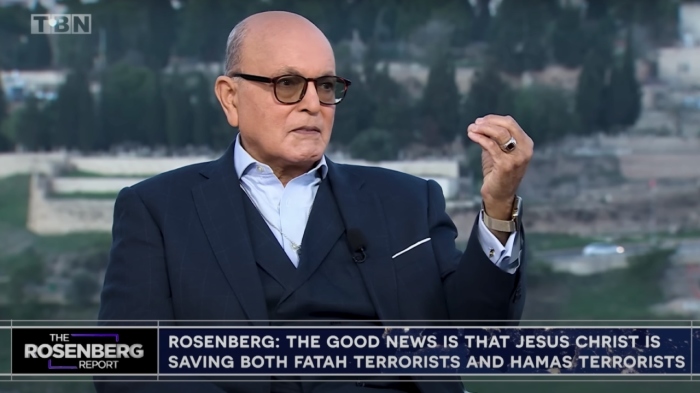Ex-terrorist who turned to Christ predicts 'huge harvest' of Gazans converting to Christianity

A former terrorist who was associated with the Fatah political party and the Palestinian Liberation Organization before converting to Christianity in the 1990s believes the Israel-Hamas war is preparing many Muslims in Gaza to become Christians.
Taysir "Tass" Abu Saada, 73, told Israeli-American journalist Joel C. Rosenberg during an interview that aired on the Trinity Broadcasting Network over the weekend that he believes the scale of violence and destruction roiling the Middle East is "not normal" and an indication that the "end of time" is quickly approaching.
But Saada also has hope the conflict is causing many Muslims in the region to become disillusioned with Hamas and radical Islam, thereby leading them to be more open to the Gospel of Jesus Christ. As a former Palestinian Muslim born in Gaza, Saada is preparing to move back to Gaza after the war is over to be part of the "harvest."
"Hamas is an ideology that is spread among many people, not only in the Gaza Strip but all over the world," Saada said. "However, God has a plan. And I believe the Arabs' and the Jews' plan is also part of that, and that is where my hope is."
Saada, who wrote the autobiographical Once an Arafat Man, recounted in testimony for JewishRoots.net how he became consumed with rage toward Jewish Israelis and others following the 1967 Six Day War. After his family moved to Saudi Arabia and Qatar when he was still young, he eventually ran away to join Fatah and fight under Yasser Arafat, the former chairman of the Palestine Liberation Organization. He would become a sniper, an assassin and Arafat's personal driver.
"After the Six Day War, I felt as if I was having a nervous breakdown, and my hatred just grew and grew," Saada remembered in his testimony. "I did not understand how we could lose so many wars against Israel. We were bigger than Israel in numbers and size, we had more equipment — everything we had was more than they had, but still, we lost the wars against them."
"I was thinking that once again, our leaders sold us to the Jews," he added. "That was when I decided to go and fight for our land, which I believed was ours."
After his family found him and forced him to return to Qatar, repeated violence and legal troubles led his father to urge him to continue his education in the West. Saada traveled to the United States in 1974, where he married an American woman and met a Christian named Charlie, who would ultimately share the Gospel with him after befriending him for over 19 years.
Saada remembered that in 1993, he was spiritually suffering when Charlie finally opened up to him about his Christian faith. In his testimony, he said Charlie told him that if he wanted to experience peace of mind, he had "to love the Jews."
"I completely froze and asked him how he could even think of such a thing — to love the Jews?" Saada wrote. "He knew I hated them. For me, as for most Arabs, a good Jew was a dead Jew."
Saada said that he was frightened and reluctant when Charlie opened the New Testament to read John 1:1 to him, but remembered that as soon as Charlie had read the verse about the divinity of Jesus Christ, he began violently shaking before fainting.
When he regained consciousness after experiencing a supernatural experience during which Jesus appeared to him in a bright light, he immediately surrendered his life to Him, he said. Saada's wife and son also became Christians.
Saada recounted to Rosenberg how he returned to Israel in 2003, knowing he would be arrested because he felt that Jesus called him to confess his violent sins to the Israelis, as well as his change of heart. After 14 hours of interrogation, an Israeli colonel allowed him to go.
Saada grew emotional telling the story of how he told a heavily-armed Israeli soldier that he once fought for Arafat but had since become a Christian and wanted to pray for him. The soldier began to cry and asked to hug him, he said.
Since becoming a Christian, Saada and his family founded Hope for Ishmael, an Evangelical outreach to Muslims and Seeds of Hope, a humanitarian nonprofit that provides necessities to impoverished people in the Middle East.
Saada told Rosenberg that many non-Christians in the region are encountering Jesus in dreams and that his sources on the ground now ministering to Palestinians in Gaza anticipate that the spiritual harvest "is going to be huge" in the wake of the conflict.
"That is why I am back in the Holy Land, to move to the Gaza Strip and take part in rebuilding," Saada said. "I believe with all the destruction, with all that happened, with the hardship the Palestinians have gone through, they cannot sit back but will ask, 'Why?'"
"God is going to do a lot of work, and I want to be a part of that," he added.




























